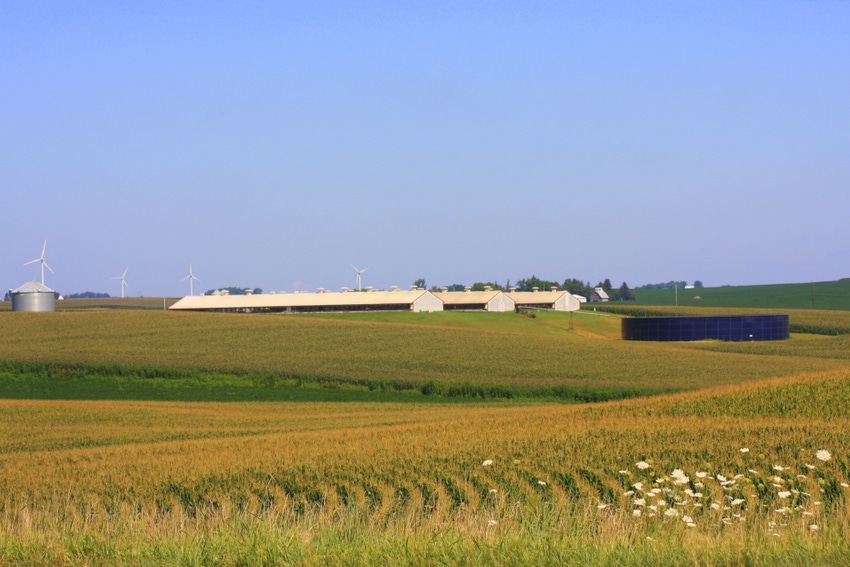Consortium forms to advance market-based stewardship program
ADM, Bunge, Cargill, General Mills and McDonald’s USA among stakeholders joining effort.
February 26, 2019

Ten private-sector companies and nonprofit organizations announced Feb. 26 their intent to join together to form the Ecosystem Services Market Consortium (ESMC). ESMC’s Founding Circle is comprised of Archer Daniels Midland (ADM), Bunge, Cargill, General Mills, Indigo Agriculture, McDonald’s USA, Noble Research Institute LLC, the Soil Health Institute and The Nature Conservancy. Mars Inc. joined the consortium at the Legacy Partner level.
The collective Founding Circle and Legacy Partner members represent a diverse cross-section of the agricultural supply chain and seek to advance the development of a market-based approach to promoting land stewardship to build healthy soils, soil carbon sequestration and water conservation on the globe’s working lands.
The launch of ESMC builds on the earlier formation of the Ecosystem Services Market Program, a product of more than 20 months of industry and sector leaders developing resources and information to establish a successful ecosystems market. The planned market offers the singular focus of enabling and encouraging farmers and ranchers to adopt and sustain conservation management practices to improve soil health, reduce greenhouse gas (GHG) emissions, improve related water quality and reduce water use. Adoption of such practices across millions of acres of the world’s working lands would have a lasting global impact, creating positive social, economic and environmental outcomes, ESMC noted.
Debbie Reed has been selected to guide ESMC as its executive director. Reed has been working on this project and its activities since its inception.
“There is no subject about which I am more passionate than working with farmers and ranchers to properly steward our natural environment,” Reed said. “I’m thrilled to lead the consortium, because I am joined by numerous like-minded organizations and individuals from across the country. We already have seen such a tremendous outpouring of support.”
Founding Circle and Legacy Partner members pledge financial support as well as their participation to create a movement to measure, verify and monetize increases in soil carbon, reductions in GHG emissions and improved water quality and water conservation from the agriculture sector.
“America’s farmers and ranchers are vital to addressing many of the conservation challenges facing the world today,” said Larry Clemens, director of The Nature Conservancy’s North America Agriculture Program. “We are excited to join other members of the consortium to work toward a sustainable food system through improved soil health that benefits farmers, ranchers, communities and our natural resources.”
Jerry Lynch, vice president and chief sustainability officer at General Mills, said, “We’re proud to partner with the consortium and its members to support farmers and ranchers who are building healthy soil on their land.” Lynch and General Mills have been involved in the effort since the early multi-stakeholder convening process in 2017 that led to the formation of Ecosystem Services Market Program and the Steering Committee that has guided its development since then.
The Noble Research Institute initiated, supported financially and led the 20 months of activities preceding the launch of the consortium. In 2019, the Walton Family Foundation provided $400,000 to further the development of the ecosystem service market and dissemination of production management practices for agricultural working lands.
“The Walton Family Foundation is proud to support ESMC as part of a movement across America’s farms toward healthier soils that are good for farmers and the environment,” said Moira McDonald of the Walton Family Foundation. This funding builds on important early support from the McKnight Foundation and General Mills Foundation.
“From the onset of this initiative, we knew that it would take at least a national effort to effect change,” Reed said. “Beginning with Noble Research Institute, these companies and organizations have demonstrated their desire to be national leaders in this space. We thank them for their support and look forward to achieving our goals together.”
With this launch, ESMC will be housed within and administratively supported by the Soil Health Institute.
Healthy soils sequester carbon, improve water quality, control runoff and reduce water demand, all of which create a cleaner environment. Healthy soils also improve crop yield and resilience while decreasing farmers’ and ranchers’ need for agricultural inputs. ESMC’s science- and standards-based focus on measured outcomes will provide the necessary transparency and rigor to track improvements in soil health and GHGs, water quality and water use, as well as additional attributes to be added in the future, such as biodiversity.
ESMC will drive the coordinated development of advanced analytical tools and technologies to cost-effectively measure and monitor changes in sustainability outcomes and contribute income to farmers and ranchers through insetting and offsetting supply chain strategies and the sale of ecosystem services credits.
ESMC is conducting a pilot test of its integrated ecosystem credit protocol on 50,000 acres of rangeland and farmland in Texas and Oklahoma. This initial test, led by the Noble Research Institute, is part of a land stewardship pilot focused on development of cause-and-effect assessment from production management practices. Future ESMC plans include additional pilots and later implementation across the U.S. in 2019 and beyond. By 2022, the program intends to encompass all major agricultural production systems and geographies in the U.S.
You May Also Like


.png?width=300&auto=webp&quality=80&disable=upscale)
